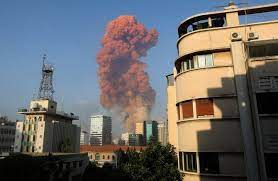Survivors of Beirut port blast lose faith in Lebanese-led inquiry
Ghassan
Hasrouty entered his office at the port of Beirut on August 4, 2020, two years
prior. He had been employed there steadily for the previous 38 years. That day,
he would not go back home.
In
Warehouse 12, where Hasrouty was working, hundreds of tonnes of dangerously
stored ammonium nitrate caught fire at 6:07 p.m. local time. He was
instantaneously slain, as did a number of his coworkers.
The
port and a large portion of the Lebanese capital were destroyed by the third
largest non-nuclear explosion ever recorded in history.
More
than 7,000 people were injured, at least 220 people died, and a city that was
already experiencing a political and economic crisis was rendered paralysed by
a mushroom cloud of pink haze.
"The
port explosion investigation will be open and transparent. Any officials
responsible would be held accountable in five days, declared Mohammed Fahmi,
Lebanon's interior minister at the time, following the explosion.
And
yet, two years later, the official Lebanese state's inquiry is still inactive
as families continue to suffer from the destruction of their homes, businesses,
and loved ones.
On
July 31, a portion of the port's now ominously famous grain silos collapsed,
scattering dust over the city and bringing back painful memories of the
explosion.
Plans
for the silos, which were severely damaged yet remarkably survived the 2020
blast despite taking much of its force, were recently approved by the Lebanese
Cabinet.
Residents
of Beirut and victim support groups have expressed fury over the decision and
demanded that the silos be kept until a thorough and appropriate inquiry into
the explosion is completed.
Many
blame the Lebanese government's corruption and poor management for the
explosion and its consequences.
The
existing quo, which dates back to the 1975–1990 civil war, has made those in
power almost untouchable, and as the case passes from one presiding judge to
the next, it has reduced the investigation to little more than a
finger-pointing contest.
By
doing so, politicians have practically guaranteed the total impunity of
officials who have been sought after for interrogation, arrest, and prosecution
for a long time.
More
than 25 petitions calling for the firing of Judge Tarek Bitar and other
investigators have been submitted by officials who may have been involved in
the explosion.
Judge
Bitar has accused four former top officials of willful carelessness that caused
the explosion that killed hundreds of people.
As
a result of the suspects' legal objections against the judge, the inquiry was
almost completely suspended in December 2021.
Ali
Hassan Khalil and Ghazi Zaaiter, two of these figures, have just won reelection
to the House of Representatives.
"After
watching how the authorities responded to the explosion, I realise that
obtaining justice will be difficult. Tatiana Hasrouty, Ghassan's daughter, told
Arab News that after two years, the corrupt regime is only obstructing
investigations and eluding justice.
She
claimed that the corruption was well ingrained and was clearly visible when
Maj. Gen. Imad Othman, the director general of the Internal Security Forces,
was seen with Ghazi Zaaiter and Ali Hassan Khalil — two guys for whom he was
meant to be issuing arrest warrants but chose not to.


Comments
Post a Comment